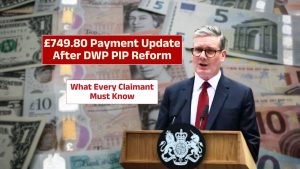As household bills keep biting and supermarket prices stay sky-high, the UK government is stepping in again. A second £300 Cost of Living Payment has officially been greenlit for 2025, offering another financial boost to the country’s most vulnerable households.
If you’re on a low income or receiving certain benefits, this could be a much-needed breather.
In this guide, we’ll break down who’s eligible, when to expect your payment, what to do if it doesn’t show up, and where to find extra help like the Household Support Fund. Let’s make sure you don’t miss out.
Overview
The £300 payment is part of a wider package of cost of living support introduced to cushion the impact of inflation and rising energy bills. It follows on from earlier payments made between 2023 and 2024 (£301, £300, and £299).
Here’s a quick snapshot of what to expect:
| Detail | Information |
|---|---|
| Payment Amount | £300 (second 2025 installment) |
| Payment Window | Expected May to June 2025 |
| Eligibility | Means-tested benefits (see list below) |
| Application Needed | No – it’s automatic |
| Reference Code | DWP: “DWP COL”, HMRC: “HMRC COL” |
| Extra Support Available | Yes – Household Support Fund via local councils |
Eligibility
To receive this second payment, you must be on means-tested benefits during the qualifying period (to be announced). These include:
- Universal Credit
- Income-based JSA
- Income-related ESA
- Income Support
- Pension Credit
- Working Tax Credit
- Child Tax Credit
Who’s excluded?
You won’t qualify if you’re only receiving:
- New Style JSA
- New Style ESA
- Contribution-based ESA
So unless you’re also getting a means-tested benefit, the £300 payment won’t apply.
Timing
The government has confirmed that payments will roll out from late May to mid-June 2025. Exact dates will be released by the Department for Work and Pensions (DWP) and HM Revenue and Customs (HMRC) closer to the time.
You don’t need to apply. The money will land automatically in your usual benefit account. Just keep an eye out for a reference like “DWP COL” or “HMRC COL” on your bank statement.
Preparation
Want to avoid any hiccups? Here’s how to stay ahead:
- Check your benefit status
Make sure you’re receiving one of the eligible benefits during the qualifying window. If you’re in the middle of applying, follow up on your claim. - Update your details
Mismatched bank info is a common cause of delay. Confirm your details with DWP or HMRC. - Watch your inbox
Stay alert for messages from DWP or HMRC through your Universal Credit journal, official emails, or letters. - Report missing payments
If nothing shows up by late June, don’t wait—report it via GOV.UK.
Alternatives
Not eligible? Don’t worry—there’s other help out there.
Household Support Fund (HSF)
Every local council receives funding to support residents in financial distress. You could get help with:
- Energy costs
- Food and essentials
- Housing
- School uniforms or appliances
For example, Blackpool Council offers a £300 cash grant for families of three or more to help with energy bills.
How to apply:
Visit your local council website, search “Household Support Fund”, and follow their application steps.
Stretching It
Let’s be honest—£300 won’t fix everything. But if used wisely, it can reduce some of the pressure. Try these simple tips:
- Use it to clear energy debts or top-up meters
- Bulk buy essentials like canned food or toiletries
- Save a bit for unexpected costs—a broken appliance, school trip, etc.
- Tap into community programs like food banks and warm hubs
Even small choices now can add up to big peace of mind later.
The second £300 payment is a welcome step in the right direction. It won’t erase the cost-of-living crisis, but for many, it offers short-term relief and a little more breathing space.
Keep your benefit records up to date, monitor official updates, and don’t forget—there’s often local support available if you look for it.
FAQs
When is the £300 payment due in 2025?
Between May and June 2025, exact dates to be confirmed.
Do I need to apply for the £300 payment?
No, it’s paid automatically to eligible recipients.
What benefits qualify me for the payment?
Universal Credit, JSA, ESA, Pension Credit, Tax Credits and more.
What if my payment doesn’t arrive?
Report it on GOV.UK if it’s missing after the payment window.
Is other help available if I’m not eligible?
Yes, check your council’s Household Support Fund options.



